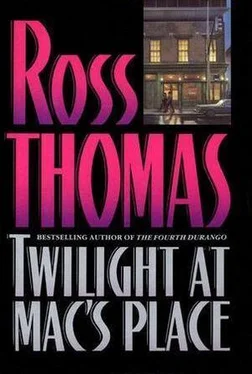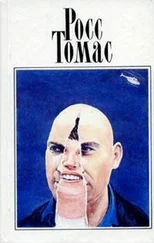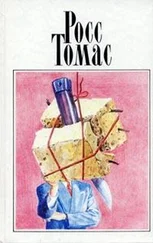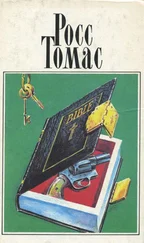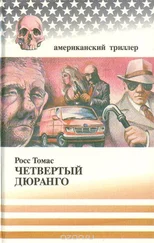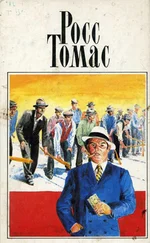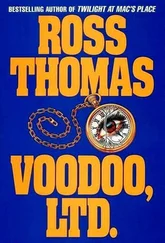When he opened the Palace in 1978, Pong had devoted most of its interior to a dining area, leaving only enough space for a small bar with a few stools where customers could have a drink while waiting for their tables.
But there had never been any waiting because there had never been any customers except for a few neighborhood ancients who didn’t much care what they ate as long as it was cheap and filling. Pong was seriously considering bankruptcy when the first of the scouts arrived.
The scouts were a clutch of white-haired OSS relics from the Second World War and the cold one that was its substitute. They were quickly followed by the assessors. These were prosperous-looking, gray-haired ex-Kennedy operatives, who still seemed to come in only two models, hearty or smooth.
After the assessors made their favorable report, the others descended on Pong’s. The largest contingent was composed of ex-CIA types (most of them dumped by Jimmy Carter) who, if pressed, admitted they still might be willing to do a little of this or a little of that. Right behind them came the new bunch — survivors of the longest war — whose thousand-yard stares had then been reduced by a third or even by half, and who kept asking everyone whether the jungles of Central America could really be all that fucking different from those of Southeast Asia.
Two months after what Pong and his wife always referred to as the invasion of les anciens espions , the Palace’s books were in the black. Pong quickly transformed the large dining area into a large drinking area; installed a much longer bar and fired his chef, replacing him with a microwave oven and a steady supply of almost edible frozen pizzas. He also hired his wife’s three pretty cousins to serve as barmaids. The cousins spoke little English but it didn’t seem to matter because many of les anciens espions spoke a semblance of French and a few even knew some Thai.
McCorkle and Padillo didn’t have to wait for their eyes to adjust inside Pong’s Palace, where the dominant colors were firecracker red and grass green and where it was always afternoon bright. As usual, most of the customers were intelligence types, past and present. There were also some mercenary hangers-on, hustling their suspect services. Unacknowledged accomplices were represented by an assortment of co-opted reporters and ambitious congressional committee staff members.
At the rear of the Palace two tables had been pushed together to accommodate seven men who sat, three to a side, with the seventh man at the far end, his back to the wall. The seventh man was a fortyish big-shouldered redhead whose bright pink skin and green eyes almost allowed him to blend in with Pong’s color scheme. The redhead now looked up, saw McCorkle and Padillo, and invited them over with a grin and a beckoning wave.
The noise in Pong’s was that of a cocktail party that had lasted ninety minutes too long. Padillo raised his voice to make himself heard. “We might as well start with Warnock.”
McCorkle agreed with a nod and a near shout. “I’ll pay the courtesy call.” He crossed to the bar and smiled at the small man who presided behind the cash register near the entrance. “How’s business, Billy?”
“It sucks. And yours?”
“Also.”
Billy Pong’s grin was gleeful. “We both a couple of fancy-pantsy liars, huh, Mac?”
Matching Pong’s grin, McCorkle said, “Still following Padillo’s advice — all cash, no plastic or checks?”
“What’s a check?” said Pong.
After McCorkle rejoined Padillo, they made their way past serious and even devout drinkers, some of them occasional customers at Mac’s Place. A few looked up to shoot quick baleful glances at Padillo.
McCorkle had seen these same baleful glares on other occasions although Padillo apparently hadn’t noticed — or pretended he hadn’t. The glares came from men in their late fifties and early sixties who had known Padillo in the old days and now glared at him with envy, malice and even outrage.
McCorkle interpreted the glares as accusations that charged Padillo with having stolen the secret of eternal middle age — if not of youth itself — and since he obviously wasn’t going to share his secret with anyone, the glares said he should be arrested, tried, convicted and maybe even hanged. McCorkle always thought of them as the Dorian Gray glares and noticed with some regret that none ever came his way.
When they reached the pushed-together tables, Harry Warnock, the redheaded man, stood up with yet another grin and a few happy nods of welcome. He then scowled at the six still seated men and said, “Move down, you lot, and give the new lads a place to sit.”
The six men, each of them either big or enormous, and all of them in their thirties or early forties, made the move without complaint. Padillo took the chair on Harry Warnock’s right; McCorkle on his left. One of the pretty cousins hurried over to take the order. Padillo stirred the air with a forefinger, signaling another round for all, and then whispered something in French that made the cousin laugh.
After she left, Warnock said with an Irish lilt that came and went like the tide. “What’d you say to the lass, Michael? I could use a giggle myself.”
“I told her that because I had to drive my father here home, I’d like some chilled Evian water in a martini glass.”
Warnock stared at McCorkle. “Has he gone teetotal on us, Mac?”
“No, but he has been getting notional.”
“Well, since it’s himself who’s buying, I’d best make introductions. Okay, lads, the generous one’s Mike and the other’s Mac. Now, starting on my left and going clockwise is Mr. Stroh, Mr. Ranier, Mr. Jax, Mr. Pabst, Mr. Schlitz and, lemme think now, Mr. Coors.”
“Why didn’t you just number them, Harry?” McCorkle said.
“Because I’m not at all sure they can count to six.”
The six big men grinned and elbowed each other in appreciation of their leader’s wit. A couple of them were still grinning when the pretty cousin returned and served the new round of drinks. Padillo gave her three $20 bills and waved away the change.
When she was gone, Warnock picked up Padillo’s glass, sniffed its contents and announced, “Pure gin.”
Padillo picked up the drink Warnock had put down, tasted it and said, “She must’ve made a mistake. Either that or I lied.”
McCorkle smiled reassuringly at Warnock. “As I said, Harry, he’s getting a little notional.”
“I’ll not be playing any of your mind-fucking games this night. Michael Padillo. So let’s get to what really brings the pair of you out to the far edge of town on this cold and miserable Sunday.”
“My wife’s in Frankfurt,” McCorkle said.
“Ah, well, then, had I known she was there and you were here, I’d’ve been there.”
“That’s very thoughtful of you,” McCorkle said.
Padillo sipped a little more of his gin and said, “How’s business, Harry? Are the terrorists taking Sunday nights off these days?”
Warnock sighed. “Business isn’t what it was, Michael, and that’s a fact. I blame some of the fall-off on the drop in oil prices which made a lot of my Arab clients cut back on security. But I blame most of it on Gorbachev himself and all that sweetness-and-light preaching of his. Jesus, it was but three, four years ago we had Libyan hit squads, sneaking across the borders up in Canada or down in Mexico, heading for the White House itself. My business shot up forty-two percent in that month alone.” He sighed again. “We’ll not be seeing the likes of those good times again.”
“The cold war’s over then?” McCorkle asked.
“Course it is. It’s just that the old dears who’d counted on apprenticing their sons and grandsons to the military-industrial trade are too stubborn to admit it — and who can blame ’em, say I?”
Читать дальше
